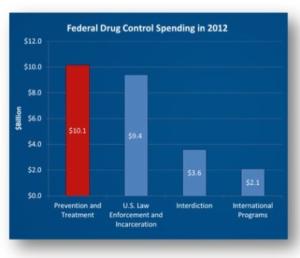Drug War Issues
Politics & Advocacy
The Obama administration released its 2012 National Drug Control Strategy and accompanying 2013 drug budget Tuesday, but while the administration touted it as a "drug policy for the 21st Century," it is very much of a piece with anti-drug policies going back to the days of Richard Nixon.

federal_drug_control_spending_2012.jpg
The administration is high-lighting a renewed emphasis on drugged driving and is encouraging states to pass "zero tolerance" drugged driving laws. It is also emphasizing the massive increase in non-prescription use of opioid pain pills.
While the strategy calls for lesser reliance on imprisonment for drug offenders, it also calls for increased "community corrections" surveillance of them, including calling for expanded drug testing with "swift and certain" sanctions for positive tests. But drug testing isn't just for parolees and probationers; the drug strategy calls for expanded drug testing in the workplace, as well.
The drug strategy acknowledges the calls for recognition of medical marijuana and marijuana legalization, but only to dismiss them.
"While the Administration supports ongoing research into determining what components of the marijuana plant can be used as medicine, to date, neither the FDA nor the Institute of Medicine has found the marijuana plant itself to meet the modern standard for safe or effective medicine for any condition," the strategy said. "The Administration also recognizes that legalizing marijuana would not provide the answer to any of the health, social, youth education, criminal justice, and community quality of life challenges associated with drug use."
This year's drug strategy looks like last year's drug strategy, which looked like Bush administration drug strategies, which looked like Clinton administration drug strategies. When it comes to the federal drug war, it's more of the same old same old.
Look for an expanded version of this news brief Thursday afternoon, with deeper analysis and commentary from drug war observers.
This work by StoptheDrugWar.org is licensed under Creative Commons Attribution-ShareAlike 4.0 International
Comments
Locked in the last century
The study Glenn Geenwald did on the effects of drug legalization 10 yrs after the fact makes moot most of the old talking points. Teenage use is down, overall use is down, use of the "harder drugs" is down and being better regulated all the time. Drug related crime is very rare these days.
Glenn put his mind and heart into digging out the real facts from propaganda. It seems a real shame that it goes to waste instead of changing things for the better good.
What a Waste
Those figures are just ridiculous. We are wasting so much money on this "war," yet prison populatinos are bigger than ever. On that note, do those figures even include the exorbitant amounts the government pays to private prison companies - the companies actually INTERESTED in keeping this drug war going?
What we really need to do is spend that money on drug treatment for prisoners. In fact, rehab INSTEAD of prison has been proven beyond a shadow of a doubt to produce better results with regards to addiction recovery and recidivism. The public clamors for punishment when anybody suggest rehabilitation, but that's really the only way to reduce crime AND spend less money in the long run.
Add new comment